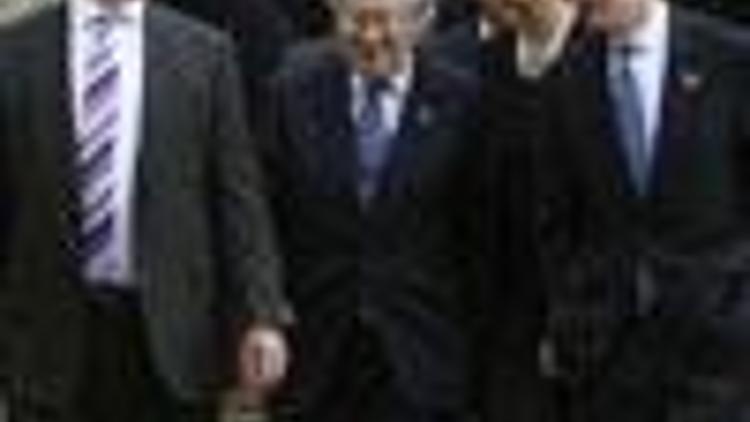G-20 countries pledge sustained action on global financial crisis
Güncelleme Tarihi:

Finance officials from rich and developing countries pledged Saturday to do "whatever is necessary" to fix the global economy, including supervision of freewheeling hedge funds and restoring bank lending by dealing with the shaky securities burdening their finances.
But officials remained cool to a U.S. push for more coordinated government spending to stimulate economies.
�
They called instead on the International Monetary Fund to assess the individual government actions already taken and what more might be required, rather than laying out definite plans to ramp up spending.
�
Finance ministers and central bankers from the Group of 20, which accounts for more than 80 percent of the world economy, agreed there was an "urgent need" for a big boost to the lending resources of the International Monetary Fund to help struggling governments in the developing world.
�
They left the specific amount and who would contribute open, to be taken up at the much-anticipated summit of the groups national leaders in London on April 2. The job of Saturdays meeting was to shape the agenda for that gathering, which will be closely watched for whether leaders can find common steps to take.
�
"Were prepared to take whatever action is necessary to ensure growth is restored and were committed to do that for however long it takes to do that," said British Treasury chief Alistair Darling.
�
President Barack Obama downplayed reports of divisions between the United States and Europe on the stimulus issue, and all the key players were keen to present a united front on Saturday.
�
Obama said the notion that the U.S. and Europe are already taking sides, with America pushing for more stimulus spending and European nations favoring tighter regulation of the financial industry, was a "phony debate."
�
"I cant be clearer in saying that there are no sides," Obama told reporters after the meeting.
�
Financial regulation "is front and center" among the issues he wants to deal with, he said.
�
"In my mind, at least, there is no conflict or contradiction between the positions of the G-20 countries and how were going to be moving forward," Obama said, adding that differences in details were being worked out. "I expect to have a productive meeting."
�
U.S. Treasury Secretary Timothy Geithner, who had pushed for Europe to match Washingtons $787 billion package of spending and tax cuts, said there was "broad consensus globally on the need to act aggressively to restore growth to the global economy."
�
Geithner said he was pleased with progress made at the talks on Friday and Saturday, but noted that the world economic and financial crisis was still playing out. "This is a very challenging period and this is still evolving," he told reporters.
�
Darling said that it was for "individual countries to decide whats right for them."
�
"Theyve got to reach a judgment as to how much they do, what effect is it having, which areas of the economy they need to support, whatevers right for them," he said.
�
Germany, which has been the most outspoken critic of the U.S. push for more spending, said that fixing the financial system has to come first.
�
"It makes no sense to pump more and more money in our economy when we havent restored the confidence on the financial market," said German Finance Minister Peer Steinbrueck.
�
Officials instead put the focus on restoring frozen bank lending through cash infusions and dealing with the shaky assets souring banks balance sheets. The U.S. is working on a plan to do that with public and private money, but details have not yet been announced.
�
The G-20 statement also agreed to some oversight on hedge funds, largely unregulated investment funds whose financial clout has grown enormously over the past decade. "We agreed that stronger regulation ... was necessary to prevent the build-up of systemic risk," he said.
�
The finance ministers said the agreed to make sure that "all systematically important financial institutions, markets and instruments are subject to an appropriate degree of regulation and oversight and that hedge funds or their managers are registered and disclose appropriate information to assess the risks they pose."
�
They also agreed to oversight and registration of credit rating agencies, clearer accounting rules for problem assets, and more standards for credit derivatives, another lightly regulated area that has raised fears of large losses.
�
Steinbrueck said it was now crucial to turn these promises into concrete action so that "every financial market ... should be supervised, regulated or overseen and that includes pools of capital like hedge funds or private equity funds."
�
The group also committed to fighting protectionism and pledged to help emerging and developing economies to cope with the loss of international capital flows, an issue that they have raised repeatedly.
�
The four major emerging economies at the meeting - Brazil, Russia, India and China - had earlier released their own joint communique, calling for a bigger role in the International Monetary Fund. The final summit statement agreed that IMF governance needs to reflect the changed global economy and the growing role of developing countries.

